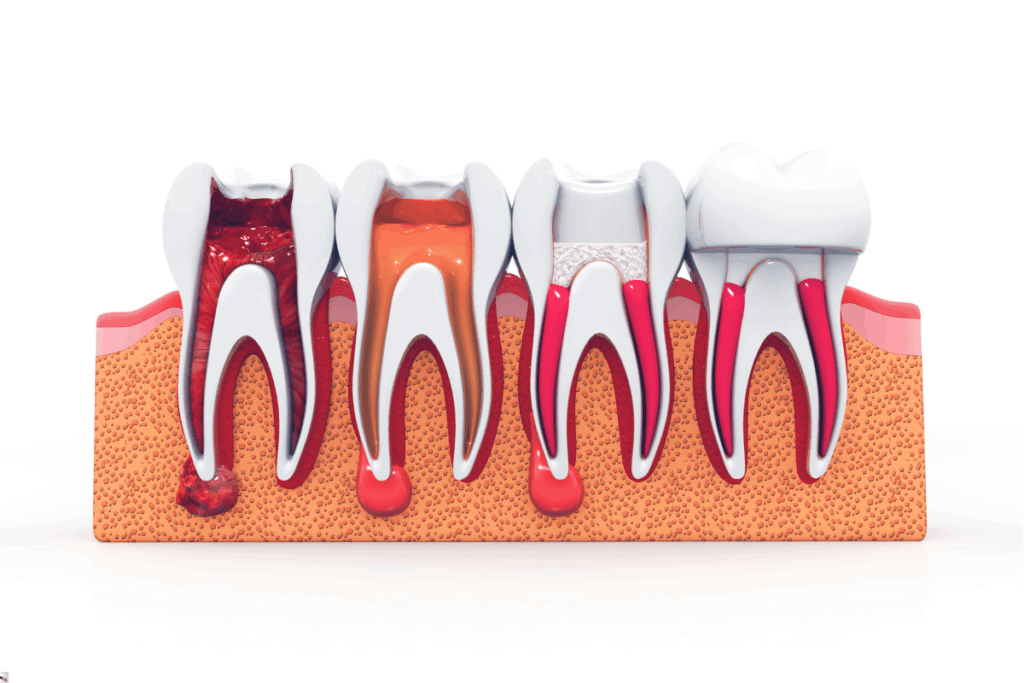A root canal is a common and highly effective dental procedure used to treat infections or damage within the soft inner tissue of a tooth, known as the pulp. This pulp, located in the center of each tooth, contains nerves, blood vessels, and connective tissue. When it becomes inflamed or infected due to deep decay, trauma, or repeated dental procedures, it can lead to severe pain or even form a dental abscess.
Thankfully, endodontic therapy (root canal treatment) can help save your natural tooth by removing the damaged pulp, disinfecting the area, and sealing it to prevent future infections. After treatment, a dental crown is usually placed to restore strength, function, and aesthetics.
Who is a Good Candidate for Root Canal Treatment?
You might need a root canal near Cunningham Road if you experience the following symptoms:
- Persistent or severe toothache
- Sensitivity to hot or cold that lingers
- Swelling or tenderness in the gums
- A darkened or discolored tooth
- A cracked or injured tooth
- A tooth with deep decay or a failed filling
If you have any of these signs, it’s time to consult a family dentist near Cunningham Road to evaluate whether you need endodontic therapy. It’s important to note that not all tooth pain requires a root canal—early intervention such as placing a dental crown can sometimes preserve the tooth without further treatment.
What Happens During a Root Canal Procedure?
Knowing what to expect during your root canal procedure near Cunningham Road can help ease anxiety. Modern root canals are safe, virtually pain-free, and usually completed in one or two visits under local anaesthesia.

Step 1: Diagnosis and Preparation
At your trusted dental clinic near Cunningham Road, your dentist will:
- Take digital X-rays to examine the root structure and detect signs of infection.
- Administer local anesthesia to ensure a comfortable and painless experience.
- Use a rubber dam to isolate the tooth and keep it dry during the procedure.
Step 2: Cleaning and Disinfection
- A small opening is made in the tooth to access the pulp chamber.
- The infected or damaged pulp is removed.
- The root canals are cleaned, shaped, and disinfected using specialized tools.
Step 3: Filling and Sealing
- The cleaned canals are filled with a biocompatible material to prevent reinfection.
- The opening is sealed to block bacteria from entering.
Step 4: Restoration with a Dental Crown
Most treated teeth require a dental crown near Cunningham Road to restore their natural function and appearance. Your dentist will help you choose the right crown based on the tooth’s location and your preferences.
Risks Associated with Root Canal Treatment
While root canal therapy is highly successful, some potential risks include:
- Post-treatment discomfort or sensitivity
- Possibility of reinfection if proper aftercare isn’t followed
- Rarely, the need for retreatment or an apicoectomy (surgical procedure)
Choosing the best endodontist near Cunningham Road can significantly reduce risks and ensure a smooth recovery.
How to Prevent the Need for a Root Canal
Preventive care is the best way to protect your teeth and avoid needing root canal therapy. Follow these oral hygiene tips:
- Brush your teeth twice a day with fluoride toothpaste.
- Floss daily to remove plaque between teeth.
- Visit your dentist near Cunningham Road for regular checkups and teeth cleanings.
- Use a mouthguard during contact sports to prevent dental injuries.
- Avoid chewing on hard objects like ice or hard candy.
- Treat cavities and cracked teeth early to prevent the decay from reaching the pulp.
Looking for the Best Root Canal Treatment Near Cunningham Road?
If you’re experiencing tooth pain or suspect a dental infection, don’t wait. Visit the best dental clinic near Cunningham Road for expert diagnosis and advanced root canal treatment. Our experienced team ensures comfortable care using modern technology and personalized treatment plans.
Book your consultation today to save your natural tooth and restore your smile!


